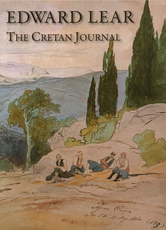
Edward Lear
Edward Lear:
The Cretan Journal
Edited by Rowena Fowler
When Edward Lear set off from Corfu for Crete in April 1864, it was in no very optimistic frame of mind. For the last nine years Corfu had been his winter home but after half a century of British rule the island had been ceded to Greece and Lear felt obliged to move. His livelihood required an immediate expedition to new scenes and he probably assumed that another book of Mediterranean travels would be likely to sell. So it was that he chose Crete.
This journal of his travels through the island — now updated and re-issued in paperback — is a detailed and sometimes minute-by-minute commentary on the landscape of Crete and a record of the ups and downs, physical and mental, of an artist travelling on foot over difficult terrain, written in Lear’s own inimitable style. As this text is from the original diary and not an emended and ‘polished’ version prepared by Lear himself for publication, it possesses a spontaneous and uncensored quality that is often missing from his other travel books. Similarly, the majority of the original drawings as reproduced in this book, which were not intended for publication or sale, have a lightness and freshness that capture the outlines and colours of a particular landscape. Together with Rowena Fowler’s introduction and comprehensive notes, the journal gives us a delightful personal glimpse of Edward Lear the man, his world, and 19th century Crete, then still under Turkish rule.
Since the publication of the first edition of The Cretan Journal in 1984 there have been significant additions to our knowledge of Edward Lear and changes to the way we approach his work. This third edition, which has been published to mark this year's bicentenary of Lear's death, has been completely re-set and includes some additional illustrations. The Introduction and Bibliography have been updated and two Appendices, which trace and list Lear's Cretan drawings and watercolours, have been added.
'Probably all travellers go in search of lost Paradise,' wrote Kathleen Raine of the first edition. 'We imagine now that it was there before the package tourists and the Sounion Hotel, when the Isles of Greece were much as Edward Lear found them — "unspoiled", with no roads and only mule tracks at best. . . . The Victorians could still find marvels enough in this world to satisfy the imagination, and although we know that earthly paradise, if anywhere, is to be found in our back garden, we cannot but read these ampler travels with some nostalgia.' The Tablet
'The illustrations . . . include some of Edward Lear's best watercolours, and the text, which is a genuine travel journal, bears the same relation to his published books as the watercolours to do to his finished oil paintings,' wrote Peter Levi. 'No writer in the 19th century is fresher or more intimate. Few watercolour painters can offer such a wonderland of transformations, and no one else as good ever painted Greece until modern times.' The Spectator
- 124 pages, 27.7 x 20.0 cm, large format, with over 60 illustrations in both colour and black and white, Denise Harvey (Publisher), 2012